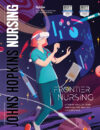To many inside as well as outside the profession, the plight of nurses during COVID can look a bit like a Greek tragedy. (A recent survey by the American Association of Critical-Care Nurses found that 66 percent had considered leaving their jobs because of experiences during the pandemic.)
“Nurses talk about how in the beginning everybody was clapping and cheering and calling us heroes,” Cynda Rushton, PhD, MSN, RN, FAAN, Anne and George L. Bunting Professor of Clinical Ethics, told the New York Times. “But then as time has gone on and you think about the social unrest, the political divide, the anger that has developed in response to the pandemic, nurses—as the people who are closest to the patient—have been the recipient of that anger or that violence and frustration.”
How appropriate, then, that Theater of War Productions would produce a version of the Greek tragedy Antigone with nursing in mind and with Rushton in the key advisory role. The March reading of The Nurse Antigone at the Johns Hopkins School of Nursing was the first in a yearlong initiative of 12 performances in collaboration with nursing organizations around the country.
In the Sophocles play Antigone, the title character is determined to properly bury her fallen brother, considered an enemy of the throne, even though that has been forbidden by the new king. When she does the right thing anyway, the king orders Antigone buried alive. “[The Nurse Antigone] is a play about not being able to live up to your own standards of care and about deferred grief, which I think is the moral injury of the pandemic,” Bryan Doerries, a founder of Theater of War Productions, told the New York Times.
Those in the play included author Margaret Atwood (The Handmaid’s Tale) as well as actors Tracie Toms (Rent), Taylor Schilling (Orange Is the New Black), Ato Blankson-Wood (Detroit), and Bill Camp (The Queen’s Gambit). Included in the Greek Chorus was Johns Hopkins Hospital’s Aliki Argiropoulos (nurse clinician II in oncology, and a graduate of the Johns Hopkins School of Nursing).
After the play, Argiropoulos helped facilitate an audience conversation on topics such as After the play, Argiropoulos helped facilitate an audience conversation on topics such as the treatment of minorities during the pandemic and normal times and dealing with colleagues who refuse to do the right thing for the good of all. “It was liberating to hear nurses from various backgrounds talk about their experiences, frustrations, hopes, and thoughts,” explains Argiropoulos. “I didn’t feel alone. We were able to validate each other’s feelings, realizing that this phenomenon is universal, and that we all have endured very similar situations.”

